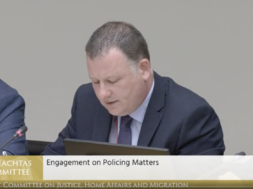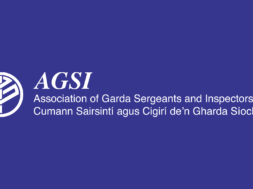“New bill demonstrates this Government’s ongoing commitment to crack down on crime” – An Taoiseac
An Taoiseach and Minister Fitzgerald announce new Bail Bill
“Bill will strengthen the law to protect the public against crimes committed by offenders out on bail” – Minister Fitzgerald
· Bill places new requirements on the Court in considering bail applications
· Courts must give reasons for bail decisions
· New power of arrest for Gardai for breach of bail conditions
· New restrictions on post-conviction bail
23rd July, 2015
An Taoiseach Enda Kenny TD and the Minister for Justice and Equality Frances Fitzgerald TD have today announced plans for a new Bail Bill. The heads and general scheme of the Bail Bill were approved by the Cabinet yesterday at their meeting in Lissadell House, Co. Sligo.
An Taoiseach and Minister Fitzgerald made the announcement ahead of their visit to the Garda College in Templemore where they will oversaw the passing out of 97 new Garda recruits.
An Taoiseach stated: “In seeking to address and prevent crime, we need to have a visible and effective policing service that families, businesses, and communities right throughout out the State, both urban and rural, can be assured of. I’m proud that, despite the economic crisis we inherited, this Government has placed a firm emphasis on strong and efficient policing.”
Minister Fitzgerald said: “This Government’s response to crime is focussed on two key objectives: recruiting more Gardaí and strengthening the law to get tougher on serious and repeat offenders. Today demonstrates how we are delivering on this dual objective. Today we celebrate the passing-out of 100 new recruits from Garda College and today we are also publishing a new Bail bill to strengthen the law to protect the public against crimes committed by offenders out on bail.”
An Taoiseach added: “This is the first comprehensive review of Bail law since 1997 and demonstrates this Government’s ongoing commitment to crack down on crime.”
Among the new reforms included in the Bail Bill are:
· Providing that courts must give reasons for bail decisions.
· Providing a Garda power of arrest without warrant for breach of bail conditions, where it is necessary to arrest the person immediately to prevent absconding or to prevent harm, interference or intimidation to the victim or a witness to the offence.
· Giving the District Court power to refuse bail where there is an appeal against a sentence of imprisonment imposed by that court. At present, the District Court cannot refuse bail when such an appeal is lodged.
· Providing for restrictions on post-conviction bail in cases where a custodial sentence is likely to be, or has been, imposed.
· Giving the Courts the power to prohibit an accused person from driving, where the person has been charged with a serious road traffic offence and the court considers this necessary to prevent the commission of a serious road traffic offence.
· Updating and extending the legislative basis for the electronic monitoring (tagging) of persons on bail.
Minister Fitzgerald added: “This new Bill will seek to improve the operation of the bail system and make the law as effective as possible in protecting the public while also safeguarding the rights of the individual. While the Bill must reflect the constraints of the Constitution and the jurisprudence of the European Court of Human Rights, the intention is that the proposed new provisions will provide better guidance to the courts on how such protection might be provided.”
The new Bill will place new requirements on the Court in considering bail applications, including:
· the courts must have regard to persistent serious offending by an applicant for bail,
· the courts must have regard to the nature and seriousness of any danger presented by the grant of bail to a person charged with an offence with a penalty of 10 years imprisonment or more (such as murder, manslaughter, drug trafficking, organised crime offences and rape).
· the courts should in certain cases hear evidence from the victim of an offence before a decision on bail is taken.
The General Scheme will be submitted to the Joint Oireachtas Committee on Justice, Defence and Equality for pre-legislative scrutiny.
A link to the General Scheme of the Bail Bill is available here: http://www.justice.ie/en/JELR/Pages/Bail_Bill
Ends…/
Note for Editors:
Background
A decision to grant bail in a particular case is a matter for the court, which is, subject only to the Constitution and the law, independent in the exercise of its judicial functions. There is a constitutional presumption in favour of bail because, in the eyes of the law, a person is innocent until proven guilty. The provisions of the European Convention on Human Rights also restrict the extent to which the right to bail can be limited.
The main statutory provisions relating to bail are Part III (Remand) of the Criminal Procedure Act 1967 and the Bail Act 1997. Section 2 of the Bail Act 1997 gave effect to the Sixteenth Amendment of the Constitution, which allows bail to be refused to a person charged with a serious offence where it is reasonably considered necessary to prevent the commission of a serious offence by that person. A “serious offence” is an offence listed in the Schedule to the Bail Act that is punishable by at least five years imprisonment. Prior to the constitutional amendment, bail could be refused essentially only on the grounds that the accused person would be likely to abscond or interfere with witnesses or evidence.
Main provisions of the General Scheme
Part 1 (Preliminary and General) contains standard preliminary and general provisions, including interpretation, repeals and transitional provisions.
In general, Part 2 (Bail Applications and Procedure) restates provisions contained in the Bail Act 1997 and Part III of the Criminal Procedure Act 1967, extending them as appropriate to courts other than the District Court.
Head 11 is a new provision that requires a court to give reasons for a bail decision.
Head 14 deals with the jurisdiction of the High Court to deal with bail applications arising from bail decisions of lower courts.
The main provision in Part 3 (Conditions of Bail) is Head 16, which provides for the conditions for bail. It restates section 6 of the Bail Act 1997 with the addition of some new provisions. Head 16 proposes that a court can impose a condition requiring the accused person to refrain from having direct or indirect contact with the complainant or any member of the complainant’s family unless the contact is authorised by the court. Intimidation can often be exerted through contact with family members. This provision is included to focus the courts’ attention on the possibility of including such a condition.
Head 16 also proposes to allow a court to impose a condition prohibiting the accused person from driving, where the person has been charged with a serious road traffic offence and the court considers that such a condition is necessary to prevent the commission of a serious road traffic offence.
Head 16(9) provides for a Garda power of arrest without warrant in circumstances where a person is about to breach a condition of bail, is in the act of breaching a condition of bail or has breached a condition of bail, and it is necessary to arrest the person immediately to prevent harm, interference or intimidation to the victim or a witness to the offence. The power of arrest will also apply in cases where a person is about to abscond for the purpose of evading justice.
Part 4 (Station Bail and Related Matters) deals with Garda station bail and release on bail of a person arrested on a court warrant where such bail has been approved by the court.
Part 5 (Refusal of bail in certain circumstances) provides for the refusal of bail by courts and for related procedural matters.
Head 26 is a new statutory provision based on the traditional grounds for refusing bail as specified in the case of The People (Attorney General) v. O’Callaghan. These grounds are that a person will not turn up for trial or will interfere with witnesses, jurors or evidence.
Head 27 restates and extends section 2 of the Bail Act 1997, which gave effect to the Sixteenth Amendment of the Constitution. It allows a court to refuse bail to a person charged with a serious offence where it is reasonably considered necessary to prevent the commission of a serious offence.
A number of additions to the provisions of section 2 of the 1997 Act are proposed. Section 2(2) of the Bail Act 1997 provides that the court may have regard to the fact that the accused person is addicted to a controlled drug. As many repeat offenders have issues with alcohol abuse, it is proposed to extend this provision to include addiction to alcohol. Additional provisions have been included to require the court to have particular regard to the persistent nature of the accused person’s conviction for serious offences and also to the nature and seriousness of any danger to any person or to the community presented by the release on bail of a person charged with an offence that attracts a penalty of 10 years imprisonment or more.
Head 27 will also include the provisions on bail in cases of residential burglary that are to be brought forward in the Criminal Justice (Burglary of Dwellings) Bill.
Head 28 is a new provision to specifically permit the courts to hear victim evidence in bail proceedings on application from a member of the Garda Síochána. The evidence must relate to the likelihood of harm or intimidation to the victim or a family member of the victim or of danger to any person.
Head 30 is a new provision regarding evidence of previous convictions in other states.
Part 6 (Post-conviction bail and bail applications in appeals) contains new statutory provisions for post-conviction bail and bail applications in cases where a conviction and sentence is appealed.
Head 33 provides for the granting of bail to a convicted person pending sentence if the court considers that a custodial sentence will not be imposed or a fully suspended sentence will be imposed or that the interests of justice require the grant of bail due to the exceptional circumstances of the person or the need for pre-sentence reports. Head 34 makes provision for the granting of bail to a convicted person pending the commencement of a sentence of imprisonment where the interests of justice so require.
Head 35 is a new provision to permit victims to voice their concerns before bail is granted after conviction in cases where there may be a risk of interference or retribution by the offender against the victim or a family member of the victim.
Head 36 is a new provision to specify that a District Court can refuse bail where a person appeals a sentence of imprisonment imposed by that court to the Circuit Court.
Head 37 provides for the circumstances in which the Court of Appeal may grant bail.
Part 7 (Breach of conditions of bail etc.) restates existing statutory provisions in relation to estreatment of recognisances, forfeiture of moneys paid into court, consecutive sentences for offences committed while on bail and failure to surrender to bail.
Part 8 (Amendment of Enactments) provides for the amendment of existing legislation.
Schedule 1 sets out the offences which are specified as serious offences for the purposes of the General Scheme. Schedule 2 lists the enactments proposed to be repealed.









